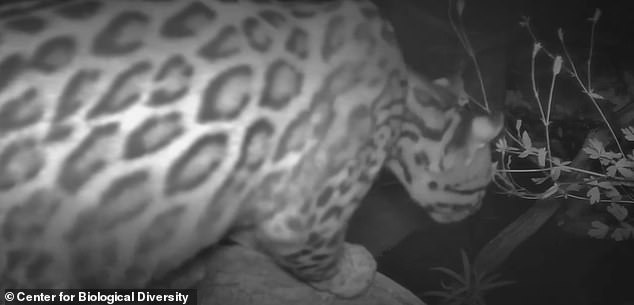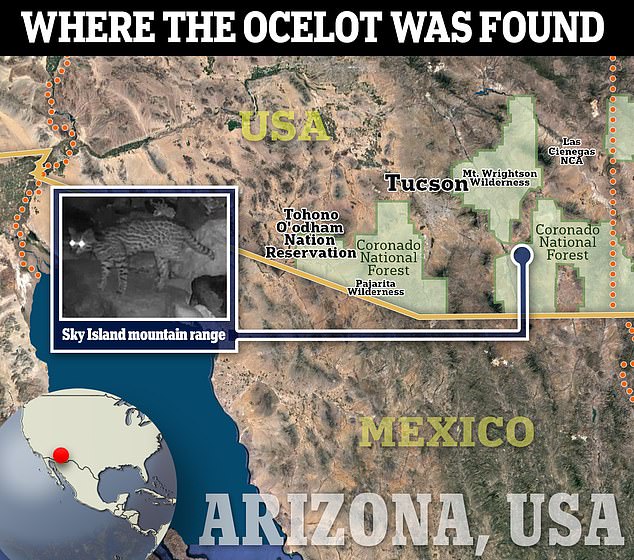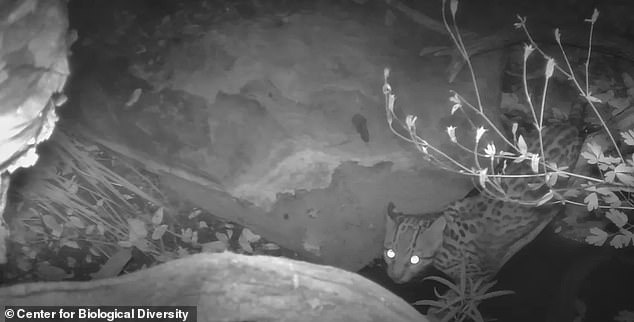Stunning trail camera footage has captured one of America’s most endangered animals gliding through the Arizona wilderness.
There are fewer than 120 ocelots left in the wild, so when one was captured on camera moving gracefully along the rocky terrain in the Sky Island mountain range in the state’s southwest, researchers couldn’t contain their excitement.
The wild cat, often called the mini jaguar, has only been seen twice in the area.
Russ McSpadden, a conservation advocate at the Center for Biological Diversity, said they could not reveal precise details of the sighting to protect their safety.
But he added that the cat was captured on camera one July night on the ancestral lands of the Tohono O’odham Nation.
“I screamed with joy when I realized what I was seeing on the trail camera,” he said.
“These incredible images show us that ocelots belong on our Sky Islands, despite all the threats they face.”
The ocelot was spotted in Arizona’s Sky Island mountain range in July on a trail camera.

Another image shows the bobcat standing on what appears to be a branch looking towards the mountainous terrain.
The Sky Islands are a series of isolated mountain ranges that rise dramatically from the desert floor and extend from northern Mexico to southern Arizona.
The ranges are biologically rich, with an ecosystem that supports an incredible diversity of plants and animals, the nonprofit conservation group explained.
“The Sky Islands serve as vital habitat corridors for species such as the ocelot, jaguar, and black bear, allowing them to move between different mountain ranges in search of food, mates, and safe shelter,” the Center for Biological Diversity explained.
The same ocelot was detected on June 12, 2024 in Atascosa Highlands, west of Nogales, by researchers at the Phoenix Zoo.
Researchers assume the ocelot traveled at least 30 miles between June (its first sighting) and July 24.
It is believed to have crossed the Santa Cruz River, in a stretch proposed to become a national wildlife refuge, crossed I-19 and moved into an area with several Sky Island mountain ranges.
President Austin Núñez of the San Xavier District of the Tohono O’odham Nation explained that ‘the Sky Island Mountains are not just beautiful landscapes; “They are living parts of our culture and identity.”
“Seeing the return of an ocelot to these ancestral lands reaffirms our sacred connection to this place and reminds us of our duty to protect these lands and the creatures that depend on them,” he continued.
“The ocelot’s survival is intertwined with our own, and we must ensure this species endures for future generations.”

A graphic shows where the ocelot was seen on the Sky Island mountain range.
Ocelots have been protected by the Endangered Species Act since 1982.
Fewer than 100 are believed to remain in the United States, with most residing in south Texas. But Arizona is home to a small but crucial population.
Ocelots have striking rosettes and chain-like spots, which allow researchers to identify individual animals, much like human fingerprints, the nonprofit organization explained.
“These distinctive markings also provide excellent camouflage in the dense forests, rugged terrain and thorny scrub that make up their habitat,” they said.
McSpadden described the species as “elegant, elusive and fiercely resilient felines.”
“They are a big part of what makes southern Arizona so special,” he said. ‘Capturing images of this cat in the wild gives me hope that it will survive.
He said, in part: “I hope this beautiful ocelot reminds us all of the critical work we have ahead of us to ensure these cats’ habitat remains intact and protected for future generations.”


